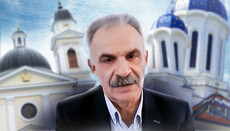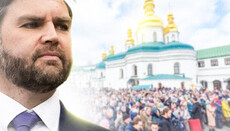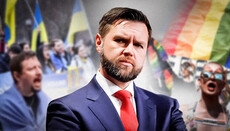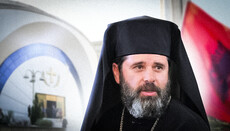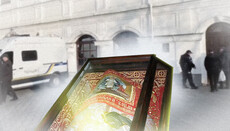A path of schism: Will Patriarch Bartholomew share the fate of Filaret?
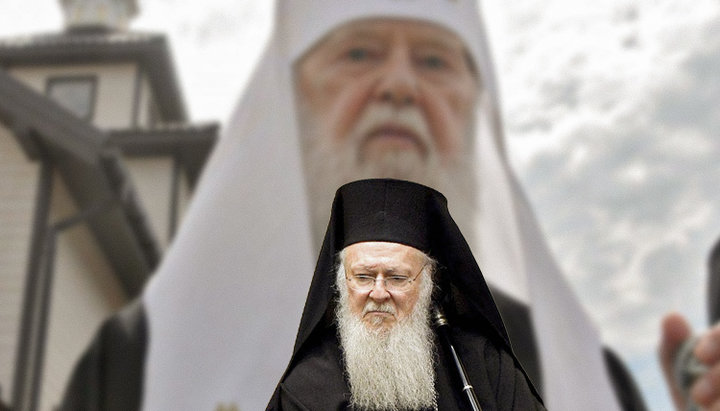
Will the Local Churches decide to convene a Pan-Orthodox Council and what will it entail for Phanar and Ukraine?
Nine months have passed since the day when Phanar recognized the Ukrainian schismatics. Over this time, several things became apparent. Firstly, the Tomos not only failed to heal the split in Ukraine, but exacerbated it even more. Secondly, it caused a split within the existing secession. Thirdly, the Tomos can now be called one of the main reasons for a hypothetic pan-Orthodox split (in addition to the power-hungry Patriarch Bartholomew and Phanar as a whole).
The situation in Ukraine is still deplorable. The seizures of temples, physical and moral violence against parishioners of the canonical Church continue. Nationalist and chauvinistic ideas are reinforced in the ranks of the OCU. Its creators are even more explicitly talking about unification with the Uniates. In turn, Constantinople and the Vatican are negotiating with renewed vigor the full communion of the two Churches – the Orthodox and the Roman Catholic.
On the other hand, not a single Local Orthodox Church has yet recognized the Tomos for the OCU. Representatives and heads of Churches reiterate that Ukrainian schismatics cannot be recognized –both because of the lack of apostolic succession and canonical consecrations, and because of the anti-canonical intervention of the Patriarchate of Constantinople in a foreign jurisdiction.
Phanar cherishes the hope that in October the Council of Bishops of the Greek Orthodox Church will be the first to recognize the OCU. However, at the Holy Synod of the Church of Greece last August, very serious objections were raised against such recognition. They were so serious that neither the Synod nor the Primate took responsibility for the ratification of the Phanar-issued Tomos for the OCU.
The Primates of other Orthodox Churches, prominent theologians and church leaders have said many times that in order to resolve this issue, it is necessary to convene a Pan-Orthodox Council.
Only official Constantinople is silent.
However, it can be assumed that Phanar is engaged in the discussion of the topic of the upcoming Council and realized that it cannot be avoided under any scenario. That is why the sympathizers of the Patriarchate of Constantinople have been trying lately to simulate the upcoming Council and prepare the most favorable outcome for Phanar.
What can this Pan-Orthodox Council be like? Who can convene it and what issues can be listed on the agenda?
What the tradition says
It was customary for secular authorities to be initiators of Ecumenical Councils, namely for the emperor of the Byzantine Empire. The reason is not in some prerogatives of the Patriarch of Constantinople, but solely in practical matters.
Here is what Sergey Bulgakov, compiler of the Handbook for the Clergy wrote on this occasion: “For the first nine centuries, Ecumenical Councils were called Councils, which, with the assistance of secular (imperial) authority, were composed of bishops of the Christian Church from various parts of the Greek-Roman Empire – ‘oikumens’ (Greek. οἰκουμένη, lat. orbis terrariim) and the so-called barbarian countries for judging dogmatic and canonical objects. The emperor, as the guardian (lat. Custos) of faith and the Church, convened the Council, made appropriations for expenses, chose a venue for its meetings, transferred from one city to another, personally attended and enjoyed an honorary chairmanship or appointed its officials to oversee the order, dismissed the Council, and at the suggestion of the Council sealed the acts of the Council with his signature.”
In the capital of the Byzantine Empire, convening a Council was easier, because power ensured the arrival of bishops (carriages, guards, etc.). All this was done with the consent of the bishop of Constantinople, i.e. the Patriarchate of Constantinople. But not a single Ecumenical Council has ever established that only the “First Hierarch of Constantinople” has the exclusive right to convene this very Council.
How this situation is viewed by Phanar
The Byzantine Empire disappeared and so did Orthodox emperors, “guardians of the faith”, but Phanar stubbornly continues to believe that only the Patriarch of Constantinople is entitled to convene the next Ecumenical Council.
For this reason, the Pan-Orthodox Council on the "Ukrainian issue" in their eyes will not have any legitimacy unless it is initiated by Patriarch Bartholomew.
However, the situation seems completely absurd, because in fact, it implies the complete impunity of the Patriarchate of Constantinople. Indeed, if the Patriarch can be judged only by the Pan-Orthodox or Ecumenical Council, and the head of the Church of Constantinople, who will not convene the Council, appears thw patriarch, then who will condemn him?
Phanariots make an allusion to the 9th rule of the Council of Antioch and the 28th rule of the 4th Ecumenical Council. But only a perverted dogmatic and canonical consciousness can deduce from these rules the postulate of some prerogatives of the Patriarchate of Constantinople regarding the convening of the Ecumenical Council.
If the Patriarch can be judged only by the Pan-Orthodox or Ecumenical Council, and the head of the Church of Constantinople, who will not convene the Council, appears the patriarch, then who will condemn him?
Canons 9 and 17 of the Fourth Ecumenical Council legitimized the practice which existed from the time of St. Nectarius and St. John Chrysostom to request the help of the capital-city bishop when disputes and confusion arose in the dioceses of the autocephalous Churches near Constantinople – Thrace, Asia and Pontus. With canon 28th of the Fourth Ecumenical Council these Churches were subjected to the Patriarch of Constantinople and in this way the territorial borders of the Church of Constantinople were defined, while its Primate was granted equal rights with the Bishop of Rome as well as with all the other Patriarchs – that is, of Alexandria, Antioch and Jerusalem – so that he should have jurisdiction over the metropolitan provinces that in turn have dioceses subordinate to them.
The 28th canon, therefore, is the key to understanding the powers which are granted by the aforementioned 9th and 17th canons. The text of the 28th canon is quite categorical – the Patriarch of Constantinople is granted EQUAL rights – no more and no less than the rights of the Bishop of Rome. Thus, if the Bishop of Rome did not have the right to accept appeals from bishops and clerics of the Church of Africa (and of the other autocephalous Churches), it is evident that neither the 9th nor 17th canon grant such powers to the Bishop of Constantinople.
Contemporary perspective
Historical facts testify that the convocation of the Ecumenical Council is not the canonical and even less dogmatic prerogative of the Patriarchate of Constantinople. Formally, the initiator can be any patriarch or primate of the Local Church.
The famous Greek theologian Pavlos Trocados writes: “All Primates are equally ‘first’ in modern reality with many states and should equally care about the stability of the Church. Therefore, they are jointly responsible for convening the Pan-Orthodox Council, since the Patriarch of Constantinople is only one of the members of the Council (as is said about the Apostle Peter). Or, perhaps, Patriarch Bartholomew is now superior to the Apostle Peter?”
The vicar of the Patriarch John X of Antioch, Bishop Qais (Sadek) of Erzurum emphasizes that "any Orthodox Church has the right to reach an agreement with other Churches and convene a Council."
Position of the Local Churches
This is exactly what the Synod of the Patriarchate of Antioch proposed when on October 6, 2018, it called for convening an extraordinary Synaxis of Orthodox Churches on the issue of autocephaly for Ukraine. According to the Synodals of Antioch, a one-sided approach to the situation does not serve Orthodox unity, but leads to secession in the Church.
On January 29, 2019, the Patriarch of Antioch and All East, John X, stated that he did not agree with attempts to unilaterally solve ecclesiastic problems leading to a split in the entire Orthodox world. “We called and continue to call on the ecumenical patriarch and other higher clergy to solve the existing problems, including the problems that our fraternal Russian Orthodox Church is facing now, through dialogue, through negotiations, through ordinary conversation,” he said.
The Romanian Orthodox Church proposed to solve the "Ukrainian issue" through a dialogue between the Patriarchates of Constantinople and Moscow, and "if they fail to succeed in a bilateral dialogue, it is necessary to convene a session of the primates of the Orthodox Churches to resolve the current problem."
A proposal was made to convene a Pan-Orthodox Council by the Cypriot Orthodox Church. Her hierarchs wrote about the events in Ukraine: “The intention of the Patriarchate of Constantinople to grant autocephaly to Ukraine was dictated by the desire for reconciliation and unity, but this was not achieved. The Church of Cyprus calls on the Patriarchate of Constantinople to convene a Pan-Orthodox Council or a meeting of primates. But even in this case, it is necessary to resolve the issue of the invalidity of ordinations committed in schism in order to ‘calm the consciousness of believers’. We also need to achieve unity between the Orthodox in Ukraine.”
The Church of Cyprus itself declared its determination to mediate in this critical issue. The Primate of the Church, Archbishop Chrysostomos, made several visits to the heads of other Churches in order to prepare the upcoming Council. He discussed the “Ukrainian issue” with Patriarch Theodore of Alexandria and All Africa, Patriarch John X of Antioch and All East, met with Patriarch Neophytos of Bulgaria, Patriarch Irinej of Serbia, Patriarch Theophilos III of Jerusalem, and the Primate of the Church of Greece Ieronymos. According to the deep conviction of Archbishop Chrysostomos, "the religious problem in Ukraine must be solved by all Local Churches together, but not each unilaterally."
“The Church of Cyprus calls on the Patriarchate of Constantinople to convene an All-Orthodox Council or a meeting of primates. But even in this case, it is necessary to resolve the issue of the invalidity of ordinations committed in schism in order to ‘calm the consciousness of believers’. We also need to achieve unity between the Orthodox in Ukraine.”
From the statement of the Orthodox Church of Cyprus
Other Local Churches hold a similar point of view.
However, as it became known from the last interview of Archbishop Chrysostomos, Patriarch Bartholomew personally opposed his mediation initiative: “We tried and even started to visit several Local Churches, but then we realized that the Ecumenical Patriarch does not want this.”
Earlier, the head of Phanar, in a letter to the Patriarchate of Antioch, called the convening of the Pan-Orthodox Council to solve the "Ukrainian issue" pointless and referred the refusal of the Primate of Antioch to participate in the Cretan Council in 2016, which Constantinople had carefully and thoroughly prepared.
According to him, after when the four Orthodox Churches, from an ecclesiastic and theological point of view, refused to share the cause of the Ecumenical Holy Council for no reason, which has no excuse, and your ancient Church was one of them, the Ecumenical Patriarchate has good reason to refrain from such a meeting at the pan-Orthodox level, which will be pointless, since it will only lead to “I-agree-to-disagree” format among the participants in the event.
Phanariots are looking for any reason to justify their opt-out position to participate in the Pan-Orthodox Council, the absence of the Church of Antioch at the Cretan Council being only one of them.
Everyone understands: Patriarch Bartholomew is against the Council, because the scales are not in his favor and he may well be held to account for his anti-canonical deeds – offering the Uniate the Holy Gifts, reinstatement of the defrocked in their priestly rank, creation of a hierarchy in parallel with the existing one, etc. However, judging by the developments, a pan-Orthodox discussion on the “Ukrainian issue” can no longer be avoided.
What will happen at the Council?
It is very difficult to predict exactly when the Council will take place, because certain conditions are necessary for convening it. But the fact that this issue requires an early resolution is probably understood by representatives of all the Churches.
For example, Metropolitan Nikephoros (Kykkotis) of Kykkos and Tillyria (Cyprus Orthodox Church) stated that “the issue of granting autocephaly to the Orthodox Church of Ukraine caused serious, serious side effects that poisoned inter-Orthodox relations and damaged the Body of Ecumenical Orthodoxy. The crisis situation that has arisen is rapidly deteriorating and threatens, if not resolved in time, by creating a schism, which will significantly affect the unity of Orthodoxy and lead to unpredictable consequences.”
Therefore, the Council of Local Orthodox Churches to resolve the "Ukrainian issue" is a matter of time. We will try to forecast two options for the possible outcome of this Council.
Option I. Canonical
Suppose that the Council adheres to the rules of the Church and makes decisions based on established canonical practices. In this case, the participants in the Council consider that Patriarch Bartholomew and the Church of Constantinople violated many of the Church’s canons:
a) following the issuance of the Tomos, a new “church” structure has been created in Ukraine being parallel with the canonical Church, which is recognized only by Phanar;
b) Phanar invaded the canonical borders of the Russian Orthodox Church and gave autocephaly to a structure that was not in its jurisdiction;
c) almost all Local Churches have serious reservations about the canonicity and legitimacy of the Episcopal ordinations of the new “Church”, but this did not prevent the Phanariots and sympathetic bishops from the Greek Church from concelebrating with the Ukrainian dissenters;
d) The canonical Ukrainian Orthodox Church (which until recently the Patriarchate of Constantinople recognized as such) did not request and did not accept autocephaly.
All the aforesaid can serve as a very substantial reason for the condemnation of Patriarch Bartholomew by the Pan-Orthodox Council. If everything goes according to the canons of the Church, the proclamation of autocephaly for the OCU is recognized as “having no legal force”, the Tomos will be recalled, and Patriarch Bartholomew will be deposed.
Such a scenario is really feasible. Here are the words of the vicar of Patriarch John X of Antioch, Bishop Qais (Sadek) of Erzurum: “We recognize the Patriarch of Constantinople with honor, but today the problem is that the Patriarch of Constantinople makes a mistake. And if all the Orthodox Churches convene a Council without him and decide on the deposition of the Primate of Constantinople, then this is possible.”
Option II. Phanaresque
We already wrote that Metropolitan Hierotheos (Vlachos), in his assumptions about the possible course of the Council, proceeds from the fact that the validity of bestowing the Tomos for the OCU is out of question. The Greek hierarch is sure that the pre-conciliar commission should prepare a decision on the issue of granting autocephaly, while the Pan-Orthodox Council will only ratify it, "bearing in mind the canonical and traditional privileges of the Ecumenical throne".
In his opinion, “This Pan-Orthodox Council must declare that today there are fourteen Churches; to affirm the patriarchal dignity and honor of some later patriarchates so that the unresolved situation can be resolved; approve the decision of the Ecumenical Patriarchate to grant autocephaly to the Church of Ukraine, so that there is the consent of fifteen Churches.”
Most likely, this is the scenario the Phanar will adhere to. It is clear it will not suit those Churches that advocate the observance of canons and the preservation of the conciliar structure of the Church. Therefore, most likely, the second option simply will not lead to anything and the issue of the deposition of Patriarch Bartholomew will only become more acute.
In both cases (if the Pan-Orthodox Council is to be held), the hierarchs of the Local Orthodox Churches will not be able to remain silent about the position of Patriarch Bartholomew. And most likely, the head of the Patriarchate of Constantinople will be deposed: in the former (canonical) option – all the hierarchs of all the Churches, in the latter (phanaresque) option – almost all the Local Churches and most of the episcopate of the Churches who do not agree with this deposition.
There is no doubt that whatever the option may be, Patriarch Bartholomew will create a schism that will continue to uphold the "mystical" prerogatives of the Patriarchate of Constantinople.
Most likely, the head of the Patriarchate of Constantinople will be deposed: in the former (canonical) option – all the hierarchs of all the Churches, in the latter (phanaresque) option – almost all the Local Churches and most of the episcopate of the Churches who do not agree with this deposition.
The only way out for Phanar that could suit everyone (except, perhaps, the OCU) is to acknowledge a mistake even before the Council and bring public repentance for granting the Tomos to the Ukrainian schismatics and concelebrating with them.
Following Patriarch Bartholomew, representatives of the OCU could also repent. Those who do not have canonical obstacles could be ordained priests, while the rest could join the ranks of good laity.
It is exactly the path to be chosen initially. Because the healing of schism involves solely repentance as a change of mind, but not legitimization of schism as a change in status.
However, the recent actions of the Patriarchate of Constantinople indicate he can hardly repent of his actions. The situation is very similar to the one that developed in 1992 in Ukraine.
Metropolitan Filaret and Patriarch Bartholomew: is history repeating itself?
In 1992, the then Metropolitan of Kiev Filaret (Denisenko) was deprived of his dignity, and in 1997 he was completely excommunicated. The reason for such strict decisions is the creation of a split. The desire to become a patriarch prompted Denisenko to destroy the Church.
Patriarch Bartholomew is acting today in the same way. Just read these words: "His love for power has led to great sorrows in Ukraine, to disagreements that are catastrophic for the future not only of Ukraine and all Slavic peoples, but at the same time of all Orthodoxy." They were told by Metropolitan Amphilochios (Radovic) about Patriarch Bartholomew. You must admit that the same could be said about Filaret Denisenko.
Indeed, these people are united not by Christ, not by the Church, but by schism – Filaret created it and Patriarch Bartholomew legalized it. Most likely, the further fate of these people will be duplicated.
Filaret did not recognize his ban from the priesthood; nor did he recognize his anathema. There is no doubt: Patriarch Bartholomew will not recognize his ban either.
Filaret considers himself a fighter for the independence of the "Ukrainian Church", Patriarch Bartholomew – a fighter for the world influence of the "Phanar Church".
Both are proud men, struck by the thirst for power.
"His love for power has led to great sorrows in Ukraine, to disagreements that are catastrophic for the future not only of Ukraine and all Slavic peoples, but at the same time of all Orthodoxy."
Metropolitan Amphilochios (Radovic)
It is probably no coincidence that Patriarch Bartholomew expresses his love and respect to Filaret. Metropolitan Amphilochios (Stergiu) of Adrianople, whom everyone calls the right hand of the Patriarch of Constantinople, on May 25, 2019 approached Filaret and said, “I convey to you the greeting from the Ecumenical Patriarch. He respects you and loves you very much.”
True, one schismatic loves and respects the other. Moreover, neither the former nor the latter has ever dropped a hint of repentance. Nine months after the creation of the OCU, when one could clearly see the ravages of this decision, Patriarch Bartholomew does not show the slightest sign of regret or, even less, remorse.
The same can be applied to Filaret, who despite having lost everything, continues his schismatic activity.
No one can change their mind without repentance.
Once again, we are witnessing a simple truth, which the Church Fathers and modern theologians and hierarchs have been reiterating: to heal the sin of schism is possible only through repentance. Not just through the recognition of one’s mistakes (although this is also good), but through the “change of mind”, a complete revision of one’s worldview and perception.
Patriarch Bartholomew must understand that he is the first (still) among equals, that there is no and cannot be papism in the Church, that the Church has a catholicity-centered rather than individual-centered structure, and that spiritual life begins and ends with repentance.
Unless Phanar is able to understand this truth, the Orthodox Church will face a schism similar to the schism of 1054.
Christ warned that in hard times, faith will fade and there will be very few Christians. But it was to them that He turned his words: “Do not be afraid, small flock, for your Father has been pleased to give you the kingdom” (Luke 12, 32).
